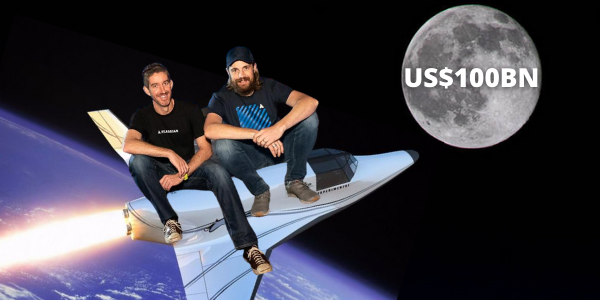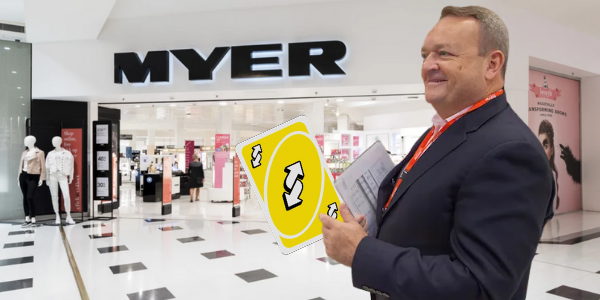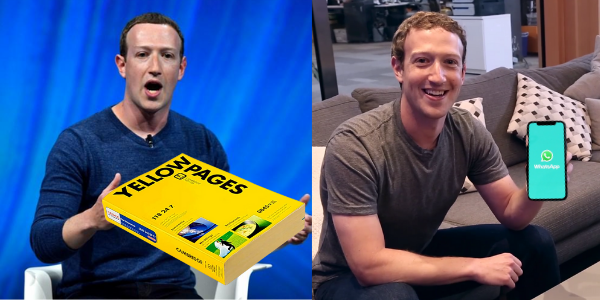Get smarter than your boss in 3 minutes with today's business news.
🏎 Atlassian just zoomed past a US$100bn market cap
🔄 Myer turns a $46 million profit after a shocker year
🔎 WhatsApp launched an in-app business directory
Hey hey Flux fam!
Are you playing our Flux daily 1 min quiz?!
The lucky winner will take home a $100 Amazon voucher. Get quizzin.
Here's everything you need to know today - in under 3 minutes.
🏎 Atlassian just zoomed past a US$100bn market cap
🔄 Myer turns a $46 million profit after a shocker year
🔎 WhatsApp launched an in-app business directory
With around 6 million users across the country, Netflix has taken out the top spot in Australia's streaming wars, according to a new study. Amazon Prime is in second place, with 2.9 million subscribers, followed by Disney+ with 2.6 million and Nine-owned Stan, with 2.4 million.

Background: Atlassian is the Aussie software company founded by now-billionaires Mike Cannon-Brookes and Scott Farquhar. They used a $10k credit card to start the biz, and they launched the first version of their flagship product, Jira, back in April 2002.
What happened: The crew turned over $1 million in their first year. 19 years later, they are turning over US$2.1bn. Now, Atlassian boasts nifty products like Confluence, Trello, and of course - Jira.
What else: The company became Australia's first unicorn - aka reached the US$1 billion valuation mark - back in 2015 after a record IPO. Now, its market cap has surpassed a whopping US$100 billion - making it a hectocorn. And it's mainly thanks to its product-led growth strategy.
💡Product-led growth is a business model, where user growth is driven by the company's product.
💡A company with a product-led growth strategy doesn't have a bloated sales team to drive sales. And, it doesn't spend a heap of money on paid advertising. Instead, it lets the product do the selling.
💡They often work using a "freemium" pricing model. In other words, the basic model is free to get started with...and when users realise they can't live without it, they pay for the premium access. It's what Atlassian's done since the get-go, and it's clearly working for them.

Background: Myer is the Aussie department store that was founded in Bendigo back in 1900. Fun fact - that's 62 years after David Jones was founded.
What happened: Myer's been hanging by a thread for a while now. It reported huge losses of $172.4 million last financial year, thanks to heavy write-downs and store closures (TY COVID).
What else: But thankfully, things look like they are finally turning around for the department store. For the financial year to June 30 2021, Myer announced a net profit of $46.4 million, and it's partly thanks to its emphasis on shifting to become a digital retailer.
💡In the past, large retailers, like Myer, cobbled together a basic website, invested very little on digital marketing and considered themselves to be ‘multichannel’ (i.e. where they have multiple channels for selling their products). But it wasn't really.
💡Back in 2018, Myer’s online sales accounted for around 6.7% of its total sales. And because of this, Myer hasn’t been able to keep pace with online retailers like The Iconic or Adore Beauty.
💡Now, Myer is showing a real shift away from its physical assets (i.e. shiny department stores) towards towards its digital assets (i.e. shiny website). And now, their online sales makes up more than 20% of their total revenue.

Background: WhatsApp is the messaging app that lets users text, chat and most importantly, roast friends in group chats.
What happened: In 2014, Facebook bought WhatsApp for a massive US$21.8 billion. It was the biggest acquisition in history at the time, and is still up there. For reference - that's 21 times more than Facebook bought Instagram for back in 2012.
What else: Now WhatsApp is adding another string to its bow with a business directory. The new feature will make it possible for users to search for businesses within the app - like a digital Yellow Pages. So far it's only in Brazil, but the company has plans to continue the rollout.
💡Since it launched Marketplace back in 2016, Facebook has been striving to become the go-to online shopping destination - and completely dominate e-commerce.
💡It started with peer-to-peer buying and selling via Marketplace, then it became full-blown e-commerce on Instagram and Facebook. Now, it's a business directory in WhatsApp.
💡More people are using phones to connect with brands and businesses, but sometimes those connections can be frustrating. Ya know, annoying hold music and all. So, Facebook wants its mobile offerings to be the solution.
Sign up for Flux and join 100,000 members of the Flux family